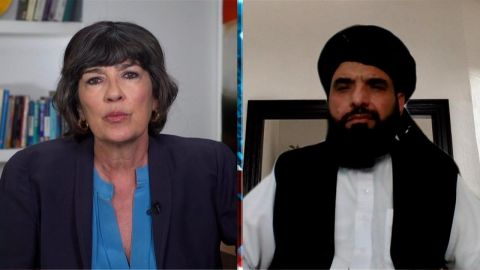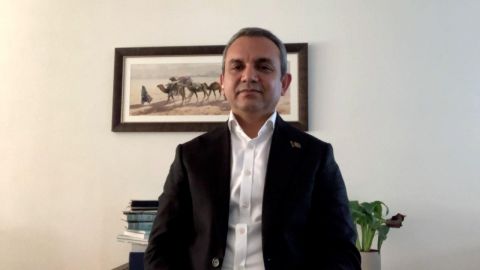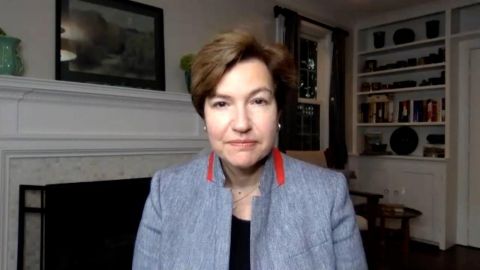Read Transcript EXPAND
CHRISTIANE AMANPOUR: So, we began the program earlier by talking about the durability of democracy in Afghanistan. Similar concerns grip the world’s oldest democracy, the United States of United States. And it is underscored by this startling question, in the waning days of his presidency, would Donald Trump manufacture a war with Iran simply to stay in power? That fear consumed General Mark Milley who was then and remains the chairman of the Joint Chiefs of Staff. The New Yorker, Susan Glasser, revealed this extraordinarily clash. And here she is talking about it with Michel Martin.
(BEGIN VIDEO CLIP)
MICHEL MARTIN, CONTRIBUTOR: Thanks, Christiane. Susan Glasser, thank you so much for joining us.
SUSAN GLASSER, STAFF WRITE, THE NEW YORKER: Great to be with you.
MARTIN: You know, we’re seven months into the Biden presidency, and yet, the former president is still dominating corners of the news. I mean, as we are speaking now, there’s been a flood of articles about both the end of his presidency, but also his business dealing pre presidency. What are the most consequential things that we’ve learned about those final months of the Trump presidency?
GLASSER: Well, I think for me certainly one of the things that was really stunning was to hear the accounts and to do reporting about the sort of backstage struggle, really an unprecedented struggle, I should say, between the chairman of the Joint Chiefs of Staff, Mark Milley, who remains the chairman of the Joint Chiefs of Staff even under President Biden, between Milley and President Trump, which really went on from June 1st of last year, that infamous Lafayette Square photo op. Milley was caught up in it. He was wearing his combat fatigues. He later apologized for this, he said, I should not have been anywhere near this highly politicized effort to essentially put the military on Donald Trump’s side of a very, very raw dispute over the nature of protests in this country. And from then on, Milley, backstage, was essentially very concerned about two things. One was that Trump would attempt to further politicize the military or perhaps even to launch a coup in the sense of trying to coop and use the military, put them in the streets in order to illegitimately remain in power after the election. And then the other was his concern that Trump was driving towards manufacturing a crisis with Iran, perhaps launching a missile strike that would escalate into a full-scale war with Iran, especially after the election.
MARTIN: Yes. That’s a story that you broke last week for “The New Yorker” about General Milley’s fight to stop Trump from striking Iran and starting a war. This is also, as we’ve said, as you mentioned, the subject of your upcoming book that you’re writing with your husband, Peter Baker. Tell us more about the story there. And why that? Why Iran? Why that particular move?
GLASSER: Well, look, Iran first of all, interestingly is one of those themes that runs through all four years of the Trump presidency. As you recall, he started out by being very hawkish on Iran. He hired a slew of advisors, people like Mike Pompeo, Mintz. He had four national security advisors, all of them were Iran hocks in a different way. Trump pulled out of the Iran nuclear deal. He called it the worst deal ever. At the very beginning of 2020, he launched a missile strike on Qasem Soleimani who was one of the most powerful figures inside Iran, the Iranian military. And really throughout 2020, even during the pandemic, and especially even after the election, his advisors, I think they wanted to finish what they thought they had started with this maximum pressure campaign on Iran. There was really a movement towards regime change inside the administration throughout. Now, Donald Trump has a more am ambivalent attitude towards that. He was not quiet quite the hawk that some of his advisors were but he was constantly tempted by it. And what really alarmed Milley, according to the reporting that I did, was this linkage that his advisors were making even at the beginning of 2020 between Trump’s political status and the electoral situation and military action. And of course, that’s not a reason, a legitimate reason to launch military action is if you think it will benefit you politically or if you think his advisors were explicitly saying, if we lose the election, then we should do this and try to take out their nuclear program. And, you know, that is very alarming.
MARTIN: Base on your reporting, Susan, how close were we to a real crisis?
GLASSER: Well —
MARTIN: I mean, yes, you have — you’ve very amply and in great detail described Milley’s concern. But based on your reporting now and all the reporting that’s come out since, how close were you to a real crisis in your view?
GLASSER: Well, in some ways, you know, the question there is inside of Donald Trump’s head, which we can’t get into. But I can say that General Milley told associates that he believed we had come very close to a conflict with Iran and that it was a much closer call than people realize, first of all. Second of all, you know, he saw these as intertwined “nightmare scenarios.” And, you know, it didn’t play out exactly as he feared. But on January 3rd was the very last time that the chairman and the Joint Chiefs of Staff spoke with Donald Trump, his commander in chief. And that meeting was all about Iran. Once again, Trump pushing, talking about Iranian nuclear program, what could be done about it and it was only when two of his very hawkish advisors, according to what Milley told his associates, Mike Pompeo and Robert O’Brien basically said, look, boss, it is too late. you know, we are lame ducks. You are leaving office. And remarkably, you know, at the very end of that meeting, then you have Trump bringing up the January 6 upcoming protest and saying to Milley and his acting defense secretary, are you ready for it? It is going to be huge. And it’s just this chilling moment, right? And January 6th is not exactly the Hitler Reichstag like scenario that Milley had warned about and that he thought there would be running street battles, as there had been earlier in Washington, D.C. between pro Trump militia types and anti-Trump demonstrators, and that Trump would use that perhaps as a pretext for calling in the military. But, you know, we know what happened on January 6th, even General Milley did not envision that they would storm the capitol in the effort to stop the electoral stop the electoral process.
MARTIN: I’m trying to understand what the presidents meant. And as you said, like one — it’s hard to know what was in his mind. It’s hard to know what is in anybody’s mind. But what was his goal in saying that to General Milley.
GLASSER: You know, we do know because the wrapper (ph) with Trump, as always, he often says in public what he also says in private. Remember that he had already tweeted out a couple weeks earlier about the January 6 protests and saying that it was going to be “wild.”
MARTIN: Wild.
GLASSER: And that he was really talking up the prospects of it. These new books have additional reporting as well from inside the White House. Trump being, by their accounts, excited. And, you know, reveling in the moment. Did you hear this? He apparently said the night before because there were already crowds gathering the night before the protests in support of him. And, you know, one of the things that those who have advised Trump or been close to him have consistently said is that Donald Trump, one of his problems with denouncing racist actions like the protests in Charlottesville in 2017, which was a first shocking moment I think of his presidency, was that when a crowd is chanting Donald Trump’s name and they are in favor of him, no matter how reprehensible their beliefs or actions are, Donald Trump just, he cannot denounce people who support him. That is just, you know, part of his psychological wiring. And I think that that does explain part of his excitement. It didn’t matter who these people were. They were there to support Donald Trump in this quixotic and sort of unbelievable crusade to overturn the constitutional order, to overturn an American election result.
MARTIN: Well, or he agrees with them. I mean, there is that.
GLASSER: Yes. Of course.
MARTIN: It is not just that he likes it. But that he agrees with them. So, that is my question, is that, did General Milley believe the purpose was to cause so much chaos that he could somehow impose martial law, that he could somehow void the results of election? I think that was the goal.
GLASSER: Yes. Absolutely. That is why we have this unbelievable situation. The chairman of the Joint Chiefs of Staff truly believe that it was a nightmare scenario, but a realistic possibility that the president of the United States was engaging in what he called a Reichstag moment, and was creating a crisis in order to solve it with martial law and a military coup. That’s correct.
MARTIN: What were the guardrails here? Was this really dependent upon the virtue, the training and the values of this handful of leaders or not? That’s, I think, the thing that’s horrifying lot of people. What is your take on that?
GUTHRIE: Yes. My view is that’s how close we came. And I will tell you that this was the most terrifying reporting in essence that I’ve ever done. To understand that the chairman of the Joint Chiefs of Staff, you know, spent more than six months worrying every single day and every single night, that he and a small handful of, you know, uniformed military chiefs were all that stood between the United States and a coup. And that the president of the United States was, in fact, one of the most serious national security threats to the United States. And you mention, you know, the joint chiefs meeting. They were meeting multiple times privately according to my reporting with General Milley at the Pentagon and discussing this scenario of what to do. The chairman of the joint chiefs was telling them, really to me an echo of Nixon and the final days when his defense secretary, James Schlesinger, was warning the joint chiefs, don’t do anything, you know, don’t go off half-cocked with any orders from the White House without checking with me first or Henry Kissinger, the national security advisor. And to me, these meetings and this discussion that were explicitly being held, you know, be on the alert, make sure there are no unlawful orders, call me first with anything. You know, this is a reflection of something deeply troubling and our system going into full red alert mode.
MARTIN: There’s been a lot of attention paid to the fact that among the insurrectionists, among the mob at the capitol there was a disproportionate number of people with military training and with the police with a law enforcement background, which is very disturbing. On the other hand, there is other data to show that the military on the whole, like there were surveys taken in the summer leading up to the election that showed that the majority of enlisted personnel and certainly the overwhelming majority of officers, I mean, if these polls are to be believed, did not support the former president, had no intention to vote for him. So, does that suggest, in a way, that there was a deeper understanding of constitutional order within the military that perhaps we’re giving them credit for, that the system did hold in that sense, that the values that uphold the constitution that value country over regime really have taken hold in the military? What do you think?
GLASSER: So, look, I absolutely do believe that that is the case. But remember, when we say the system worked, it shouldn’t be all that comforting that we had to use the emergency parts of the system. You know, when it comes down to it, you know, when the system is flashing red in this unprecedented way, and it is unprecedented. I was just having this discussion with very senior officials. When you are down to the chairman of the Joint Chiefs of Staff dealing with something like this in this way, believing that “nightmare scenarios” are coming out of the White House and activating essentially this kind of emergency protection for the constitution measures, like this is not reassuring. To say that that part of the system worked is to say like just when your home alarm works. You know, it still means that, you know, your home, somebody was trying to break into it, right? And I think that it was a very close call. In a way that should, you know, shock all of us. And that we need to think about that. Remember, in true on the electoral side as well. The fact that there were officials, election — Republican elected officials in Georgia or in Michigan on the Board of Canvassers who, you know, refused to go along with the sort of fraudulent claims of election rigging. It should never come down to one guy on the Michigan Board of Canvassers, right? Like to me, you can say either that the system worked there or you can say, wow. You know, our institutions are only as good as the individuals who fill those roles.
MARTIN: What is the former president had to say about all of these stories? I know he spoke to a number of journalists over the course of reporting and I know he’s had a number of things to say. What — how he has responded to all this?
GLASSER: Well, you know, Trump in his exile, obviously, has been banned from social media, from Twitter and Facebook. He now puts out these very voluminous e-mailed statements to the press and the public. And he has had a lot to say in those statements about this new round of books. He said, well, I don’t know why I bothered with these journalists anyways. He gave interviews to many of these journalists, including, I should say, to my husband and myself earlier this spring. He commented on the news about General Milley several times basically saying he didn’t think much of General Milley. He didn’t like him. And oddly confirming, in some ways, some extraordinary details. He said basically, I only appointed General Milley in an act of spite against my previous defense secretary, which in and of itself and any other president would have been a huge revelation. He also criticized General Milley and basically confirmed that I soured on the chairman of the Joint Chiefs of Staff after he apologized for participating in the June 1 Lafayette Square photo op. And then I knew essentially that he wasn’t loyal and he wasn’t really on the team and he was weak. Which, as you know, is one of Donald Trump’s favorite epithets and criticisms of those who disagrees with. And to me, again, that is kind of remarkable. Trump is admitting that he wanted the general to have participated in this politicized action and that he was infuriated when there was an apology offered. Which is basically confirming one of the key things that I reported in my story in the “New Yorker,” which is that Milley had had a confrontation with Trump in the Oval Office after he apologized publicly. And Trump ranted at him and said, you know, how dare you do that. And he said, apologies are a sign of weakness. And the chairman of the Joint Chiefs of Staff said, not where I come from. You know, when you do wrong, it is very important, you know, for us, it is an ethic and a duty that if the uniform has been politicized, that is our most sacred thing. And he said to Trump, I don’t expect you to understand. And I thought that was so revealing about their relationship. Because clearly Donald Trump did not understand.
MARTIN: Susan Glasser, thank you so much for talking with us.
GLASSER: Thank you.
About This Episode EXPAND
The New Yorker’s Susan Glasser broke the story of Former President Trump and General Mark Milley’s clash on Iran and joins the show to discuss what she found.
LEARN MORE



